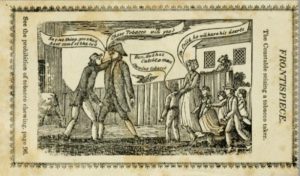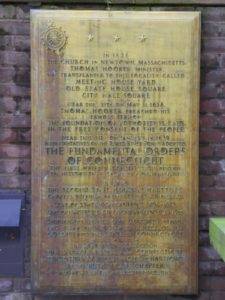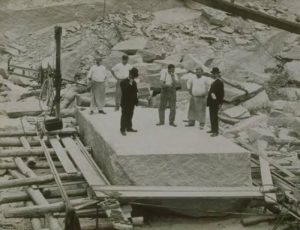By Emily Clark
Though Connecticut’s official nickname is the “Constitution State,” most who grew up here also learned in grade school that it could be called the “Nutmeg State” or the “Land of Steady Habits.” But how about the “Provisions State,” the “Freestone or Brownstone State,” or the “Blue Law State”? Though small in size, Connecticut has been known by many names–some more flattering than others–throughout its almost 400-year history.
The Blue Law State

Prohibition of Tobacco from The Code of 1650, Being a Compilation of the Earliest Laws and Orders of the General Court of Connecticut edited by Silas Andrus, 1830
The Puritans, some of Connecticut’s earliest settlers, indirectly helped coin one of the first nicknames: the “Blue Law State.” While some say the rules took their name from the blue paper on which they were written, others feel the term “blue” referred to the founders’ straight-laced, firm, and prim behaviors. Reverend Noah Welles penned a booklet satirizing existing laws which guarded against behavior such as gambling and drinking, traveling on Sunday, and missing religious services. Over time, the legislature repealed these seemingly outrageous laws in gradual succession, with the final one–a ban on selling liquor on Sunday–ending in 2012. Tales surrounding them, however, earned Connecticut this nickname.
The Provisions State
Another early moniker originated during the Revolutionary War when Connecticut provided generous “provisions” in the form of men, food, cannons, and other supplies to the Continental army, which had multiple ammunition outposts around the colony. Governor Jonathan Trumbull supported the Patriot cause early in the war and helped coordinate military operations, solidifying his home as the “Provisions State.”
The Land of Steady Habits
Though generous with supplies during the colonial period, Connecticut traditionally had residents who followed strict rules of moral character, dating back to the time of the “Blue Laws” and leading it to be known in the early 19th century as the “Land of Steady Habits.” While positive in that the state had a good reputation for values and modesty, the nickname also had negative associations when it referred to its inhabitants’ reticence to change, evidenced by the frequent re-election of wealthy, steadfast politicians.
The Freestone and Brownstone State
Connecticut’s abundance of quarries, from Canaan and Greenwich to Cromwell and Portland, gave the state additional nicknames: the “Freestone State” and the “Brownstone State.” Used to construct homes and government buildings, brownstone from the Portland quarries made Connecticut famous, employing hundreds of European immigrants in the 1800s. The sandstone (or freestone) also found in the state’s quarries led to yet another, though less common, name.
The Nutmeg State
Be it ammunition, strict morals, enduring stone, or well-to-do statesmen, Connecticut seems to have all the makings for commendable, sarcastic, and even outdated nicknames. The most well-known (albeit unofficial) has a more humorous quality to it and, like several of the others, not an altogether admirable reputation. “The Nutmeg State” derives from the late 19th century when resourceful but disingenuous peddlers are purported to have sold wooden “nutmegs” among their otherwise honest wares to unsuspecting customers for a decent profit. No lasting credible evidence exists, however, to prove these vendors did indeed sell such wooden nutmegs. “It’s not really clear if anybody did that…or if it originated in the idea that Yankee peddlers were so good at their business that [they] would be able to sell you a wooden nutmeg,” said Natalie Belanger, Adult Programs Manager at the Connecticut Historical Society. Resembling the seed from which the spicy powder originates, these poor imitations were worthless, but they–and their stories–provided shrewd merchants from Connecticut a long-lasting legacy.
The Constitution State

Placard commemorating the adoption of the Fundamental Orders of Connecticut, January 14, 1639 – Connecticut’s Old State House
Finally, in 1959, the state’s General Assembly voted to make one nickname official. Since then, the title “Constitution State” has paid tribute to our colonial history, alluding to the Fundamental Orders of Connecticut, considered one of the first written documents of its kind. To add credibility to the name, Simeon E. Baldwin, a former Chief Justice of the Connecticut Supreme Court, said, “Never had a company of men deliberately met to frame a social compact for immediate use, constituting a new and independent commonwealth, with definite officers, executive and legislative, and prescribed rules and modes of government, until the first planters of Connecticut came together for their great work on January 14th, 1638-39.”
Though not as humorous as the origins of the “Blue Law State” or venerable as stories behind the “Provisions State,” the official name honors those “first planters” who not only planted the seeds for the crops that made Connecticut prosper but who also laid the foundation for the remarkable state that its residents now call home.
Emily Clark is a freelance writer and an English and Journalism teacher at Amity Regional High School in Woodbridge.










